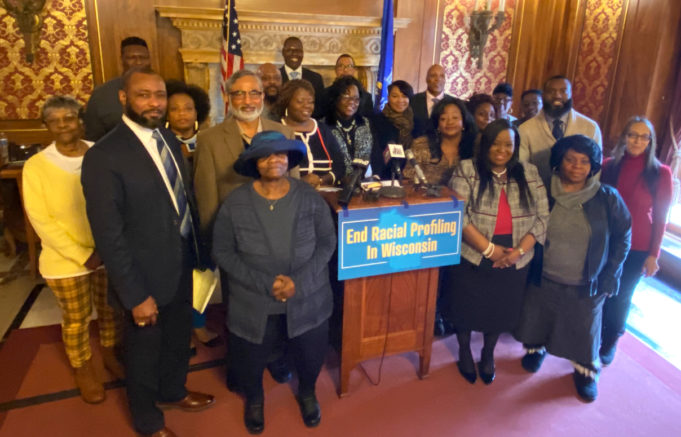State Representative Shelia Stubbs made national news when somebody called the police on her while she was campaigning for office. Stubbs, her 71-year-old mother and her 8-year-old daughter, were all mistaken for drug dealers as they campaigned door-to-door for her Wisconsin State Assembly seat on the west side of Madison in August of 2018. An anonymous person reported them to the police.
“I had to show three levels of ID to prove to the police officer who I was. It was an issue that my race was out of place for that community, a predominantly white community,” Stubbs remembers. “I’ve never had a chance to talk to that caller and I can’t tell you how humiliated I was to be told I am I was someplace I shouldn’t have been. All I was doing was knocking on doors [for my campaign]. I can share with you [afterward] that it was the hardest 24 hours of my life. I literally had to stop my campaign just to get myself off the floor.
“But I stand here today to tell you that that incident did not stop me,” Stubbs continues. “Because of that incident, I am standing here today fighting for everyone across this state and across this nation who is experiencing profiling just because of their race. I’m here to say that the victim’s voice must be included. The victim’s voice must be heard.”
On a Friday morning press conference at the Wisconsin State Capitol Assembly Parlor, State Rep. Stubbs and State Rep. David Bowen (D- Milwaukee) officially announced legislation that creates a civil cause of action for racially motivated police calls, or profiling by proxy, in Wisconsin.
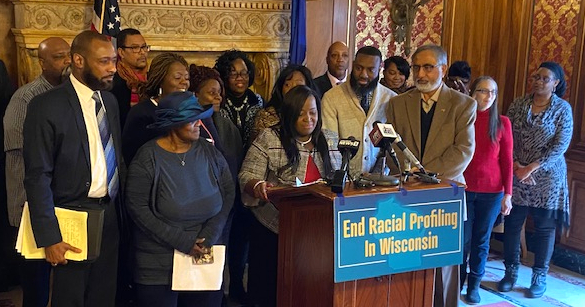
“It is time to end profiling by proxy in the state of Wisconsin,” Stubbs said at the press conference. “This legislation is a result of black and brown people having the police called on them when they are engaging in perfectly legal everyday activities like napping, barbequing, riding the train, golfing, shopping, driving down the highway and even campaigning.”
Stubbs added the bill is just one step towards achieving equity in Wisconsin and in our communities.
“This bill is victim orientated and establishes the victims of these calls may sue these callers for up to $250. This bill creates a pathway to justice for victims who are feeling humiliated, discriminated, and who fear for having the police called on them for doing nothing but existing,” she said. “What it comes down to is being the wrong race in the wrong place.”
LRB-3944 will help minimize the pointless 911 calls, Stubbs said, by giving dispatch and law enforcement the ability to use their own discretion.
“We need to keep law enforcement resources where crimes are actually happening in order to keep our communities safe,” she said. “In no way does this legislation discourage citizens from calling the police for actual crimes. Rather, it encourages folks to think harder about their own perceptions and their individual biases because unnecessarily summoning a police officer and wasting their resources is just unacceptable.”
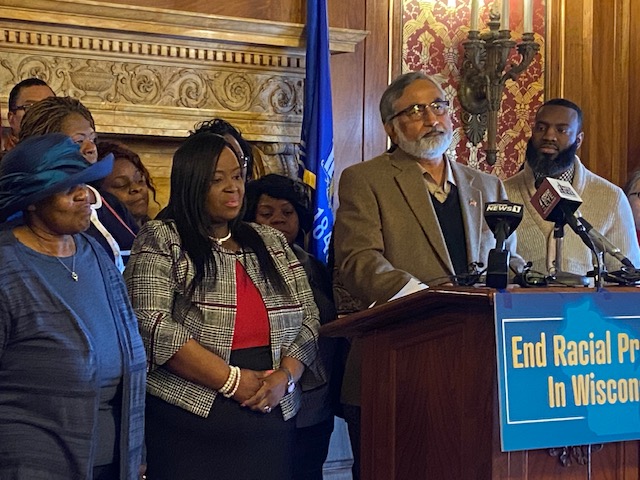
Community leaders stood behind Stubbs as she spoke and some of them took turns speaking at the event including Masood Akhtar, the founder of We Are Many-United Against Hate, a nonpartisan, nonprofit organization of common people that seeks equal protection for all, united against hate, bigotry and racism. Akhtar detailed recent instances of racial profiling against Muslims that he found disturbing.
“However, I still believe in America. Its diversity is its strength. Unity is its power. And the constitution is its hope. So let’s be proactive and let’s be very strategic in our approaches,” he said. “And let’s be non-partisan. And let’s act because silence is not an option. Today is a good start.”
State Rep. Bowen said that he, too, has experienced racial profiling and that “we are talking about Wisconsin residents having the right to exist in the state of Wisconsin.”
“And not to be wrongfully accused or threatened with law enforcement. That is a right that Wisconsin citizens deserve to have so that we can move freely and do what they want,” Bowen said.
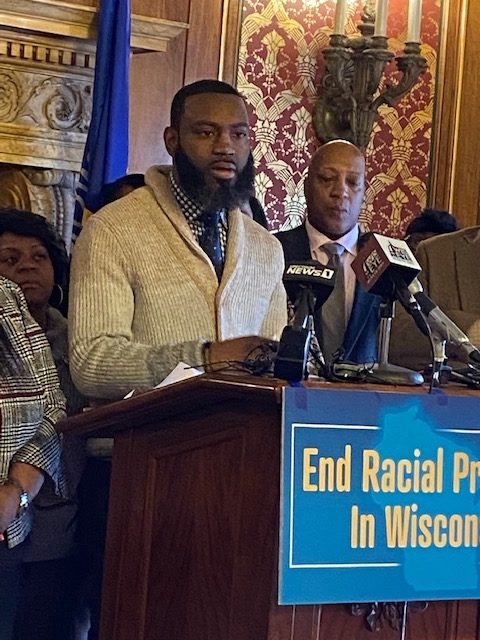
Bowen says that he gets calls in his office by citizens who are concerned when young people are playing basketball in the suburbs around Milwaukee or in Shorewood.
“There are calls made to the police department that say, ‘Hey, go handle those students. Go check on those students.’ They wrongfully accuse them just for the sake of them recreationally playing in the neighborhood. But it really underlies the portion of them not belonging in that community,” Bowen says. ” We know for a fact that this land was made for all of us to be able to roam and to be able to do what we want. We want to have a Wisconsin that respects everybody. That’s why I am honored to co-author this bill.”
Former Madison Police Chief Noble Wray said that he supports the bill after 30 years in law enforcement including 10 years as Chief of Madison Police.
“I support the legislation because it deals with the issue of profiling by proxy – that is when somebody calls the police with a biased intent, but the police have to no choice to respond depending on the circumstances,” Wray says. “The police respond and do what they have to do, but the victim is left with reputational harm, they are left feeling intimidated. An action of an officer can affect someone for a lifetime, and a community for generations.”
Wray mentioned the incident at Starbucks in Philadelphia that received national attention where police were called on a black man for sitting.
“That was an example of profiling by proxy. Why do we have a police officer go to a call and take up precious law enforcement resources for a bogus intent?” Wray asked. “I think statewide law enforcement will support this bill.”
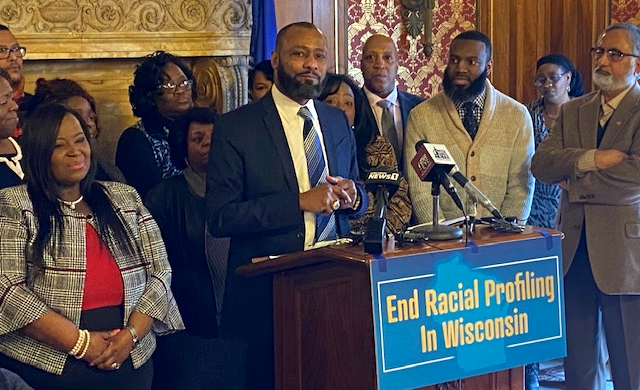
Wray said that the bill will raise the consciousness in the community.
“Implicit, explicit … bias, in general, is not just a law-enforcement issue. It’s a community issue. Because it takes a community to call law enforcement,” Wray said. “We understand this; it’s called ‘race out of place.’ It is when a citizen has a legitimate and legal reason for being there when someone calls. Sometimes that may happen in an implicit manner, but when it happens in an explicit manner – when someone calls the police because of a race intent – that’s what this bill is trying to get at.
“It’s not trying to chill someone calling the police. In fact, it doesn’t do that,” Wray added. “By the structure of it, the person that is victimized can go forward and bring forward a complaint and it’s easier because of this bill because what this bill does is it codifies for the state of Wisconsin and its citizens and the judicial process that this is a real issue.”

























